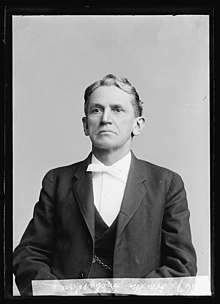William N. Richardson
William Richardson (May 8, 1839 – March 31, 1914) was an American politician and lawyer.
William Richardson | |
|---|---|
 | |
| Member of the U.S. House of Representatives from Alabama's 8th district | |
| In office August 6, 1900 – March 31, 1914 | |
| Preceded by | Joseph Wheeler |
| Succeeded by | Christopher C. Harris |
| Member of the Alabama House of Representatives | |
| In office 1865–1867 | |
| Personal details | |
| Born | May 8, 1839 Athens, Limestone County, Alabama |
| Died | March 31, 1914 (aged 74) Atlantic City, New Jersey |
| Resting place | Maple Hill Cemetery[1] Huntsville, Alabama |
| Nationality | American |
| Political party | Democratic |
| Spouse(s) | Elizabeth Rucker |
| Profession | Attorney |
| Military service | |
| Allegiance | |
| Branch/service | |
| Rank | |
| Unit | |
Born in Athens, Alabama to William Richardson and Anne Davis, Richardson served in the Civil War, fighting for the Confederacy.
Civil War
Richardson enlisted in Co. K, 50th Regiment Alabama Infantry[3] and was wounded in the battle of Shiloh and was taken prisoner. He escaped from prison, was caught, and about to be shot as a spy at Murfreesboro when "on the morning air there came to our ears with heartfelt welcome the famous rebel yell," and General Forrest with his "critter company" rescued him. This account is given in Andrew Nelson Lytle's Bedford Forrest and His Horse Critters. William then joined Company E of the 50th Alabama Infantry Regiment, and was again wounded at Chickamauga. He was paroled in April 1865 in Marietta, Georgia.[4]
Political office
After the war, Richardson returned to Limestone County and served in the Alabama House of Representatives between 1865 and 1867 from that district. He studied law and was admitted to the bar at Huntsville in 1867. Between 1875 and 1886, he served as judge of the probate and county courts of Madison County. Richardson played a major role in the election of George Smith Houston as governor the next year. He was a delegate to the Democratic National Convention in 1904.
He was elected as a Democrat to the Fifty-sixth congress to fill the vacancy caused by the resignation of Joseph Wheeler. He was reelected to the Fifty-seventh and to the six succeeding Congresses. He served until his death.[5]
Personal life
Richardson married his cousin, Elizabeth Rucker, of Lynchburg, Virginia in 1872, and they were the parents of five children.
Richardson was often troublesome to the Union victors after the Civil War. He was wanted by the North, but was never caught. Once, he tarred and feathered a Union carpetbagger, tied him to his horse, and dragged him through the streets of Huntsville. He later ran to a cave and hid for about a year. Soon after, he was elected to the House.
Richardson was also very large. He was considered a giant by many people of the time period. Portraits of him exist which depict him seated on a large horse with his feet nearly touching the ground. Though his actual height was never recorded, he was said to be somewhere between 6' 9" and 7' 2".
Richardson died on March 31, 1914 in Atlantic City, New Jersey, where he had gone for his health, and is buried in Maple Hill Cemetery in Huntsville.[6]
See also
- List of United States Congress members who died in office (1900–49)
Notes
- "William Richardson". Find A Grave. Retrieved 7 May 2018.
- "Soldier Details". National Park Service. Retrieved 7 May 2018.
- 50th Infantry Regiment was organized at Corinth, Mississippi, in March, 1862, by consolidating the 2nd and 5th (Golladay's) Alabama Infantry Battalions which were recently recruited. Originally mustered into Confederate service as the 26th (Coltart's) Regiment, its designation was changed to 50th in June, 1863.
- "The Lure and Lore of Limestone County," by Chris Edwards and Faye Axford, (Tuscaloosa, AL: Limestone County Historical Society, 1978), page 11; "To Lochaber Na Mair": Southerners View the Civil War," (Athens, AL: Athens Publishing Co., 1986), Page 214n.
- "Biographical directory of the United States Congress."
- Congressional Biography.
References
- United States Congress. "William N. Richardson (id: R000227)". Biographical Directory of the United States Congress. Retrieved on 2008-02-14
- Kestenbaum, Lawrence. The Political Graveyard. Accessed December 5, 2006.
![]()
External links
- Encyclopedia of Alabama
- "William N. Richardson". Find a Grave. Retrieved 2008-02-14.
- William N. Richardson, late a representative from Alabama, Memorial addresses delivered in the House of Representatives and Senate frontispiece 1915
| U.S. House of Representatives | ||
|---|---|---|
| Preceded by Joseph Wheeler |
Member of the U.S. House of Representatives from Alabama's 8th congressional district August 6, 1900 – March 31, 1914 |
Succeeded by Christopher C. Harris |